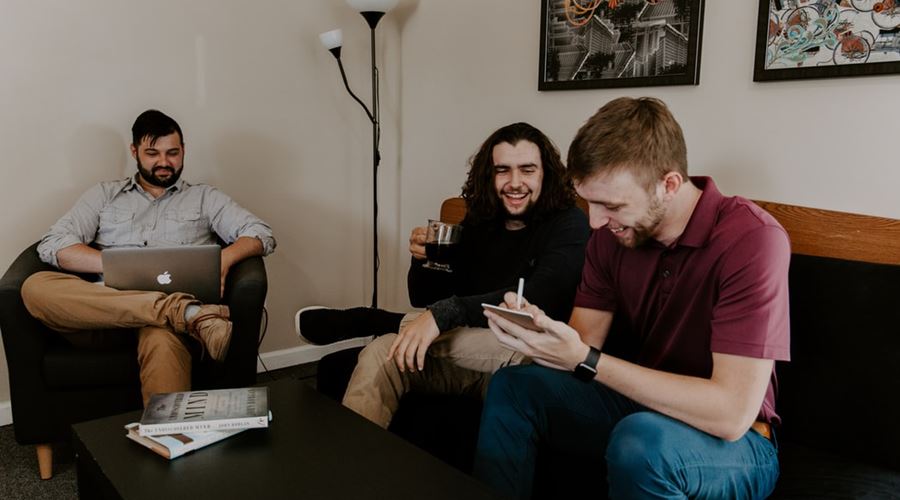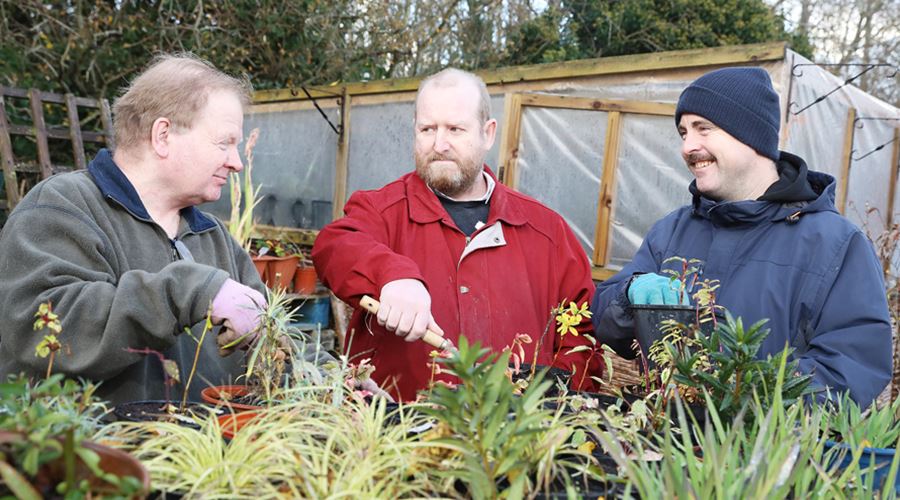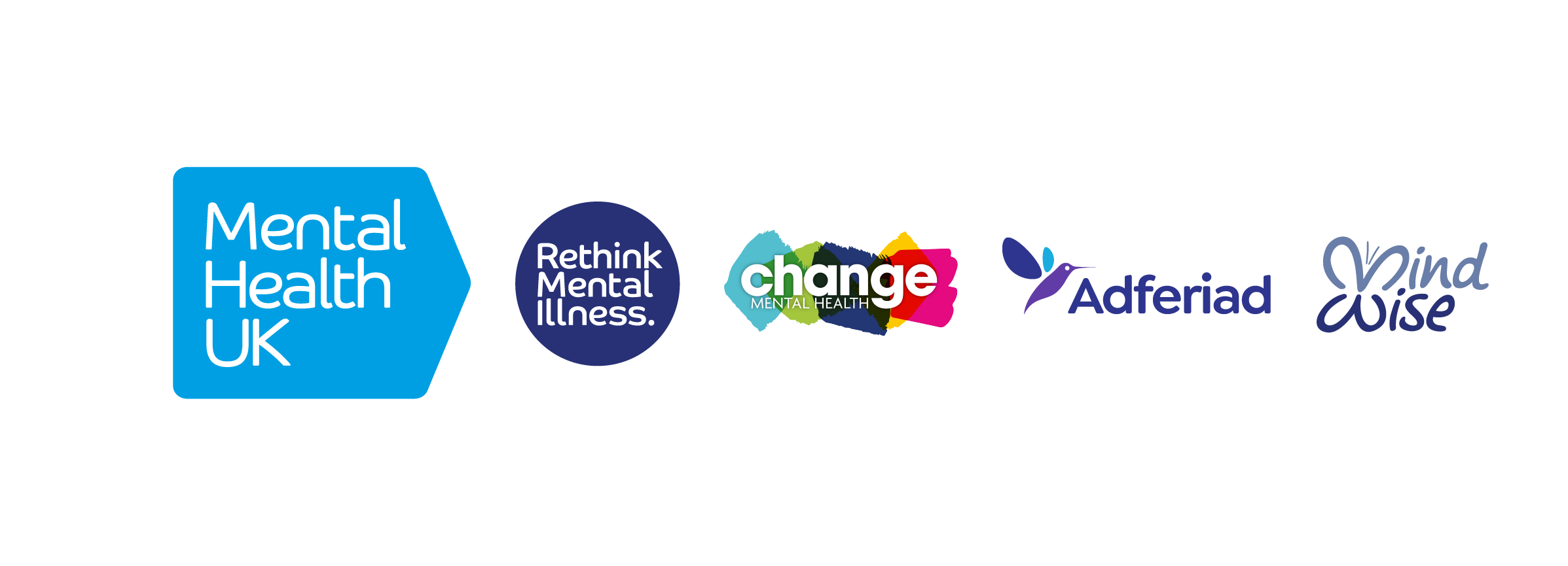- Home
- News & Blogs
- Current: All Party-Group On Mental Health
Do you need urgent help?
If you need to speak to someone right now, here are some confidential options which provide 24/7 support. If you're worried you might hurt yourself or someone else, please call 999, or go to your nearest A and E.
Childline
Helps anyone under 19 in the UK with any issue they’re going through. Childline is free, confidential and available any time, day or night.
0800 1111Samaritans
24 hours a day, 365 days a year. You don't have to be suicidal to call us
10-Year Mental Health Strategy - Update from the Mental Health Champion
Tue, 27 - September - 2022
What is the All-Party Group on Mental Health?
"The All-Party Group on Mental Health brings together members of the Northern Ireland Assembly from different political parties, along with external mental health organisations and experts, in order to have an open forum to consider mental health issues. Together, we help to shape the agenda and our discussions with the Group often lead to projects that go on to inform policy. Anyone is welcome to attend because mental health and wellbeing is everyone's business."
All about the All-Party Group on Mental HealthMindWise has resumed Secretariat duties of the All-Party Group on Mental Health.
Many thanks to the Mental Health Champion Professor Siobhán O'Neill for attending the All-Party Group on Mental Health yesterday to give an update on the 10-Year Mental Health Strategy. If you weren't able to attend, here's a summary of what was discussed and what's coming up for the next year.
Professor O'Neill contextualized the issues facing Northern Ireland.
1 in 8 young people and 1 in 5 adults have poor mental health. Young people in Northern Ireland experience ill mental health at a 25% higher prevalence than in the rest of the UK. Mental ill health costs NI (at least) £3.4 billion annually. 72% of that is lost productivity. The cost of the Mental Health Strategy is £1.2 billion over 10 years, which makes it great value.
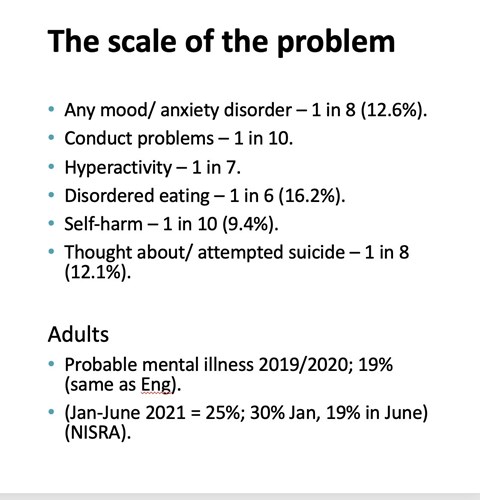
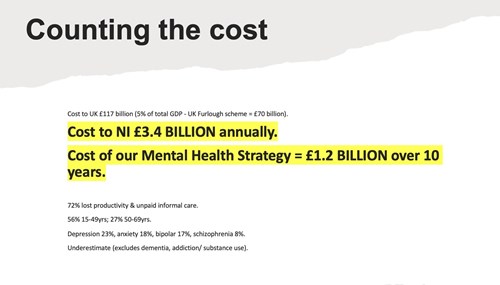
The true cost of mental ill health is likely to be an underestimate, as the figure doesn't include dementia and addictions.
Further implementation of:
- Department of Education Framework for Children and Young People’s Emotional Health and Wellbeing in Education - more services in schools, e.g., CAMHS teams, Early Intervention (RISE), Text-a-nurse and Prevention (FLAIR).
- "Preventing Harm, Empowering Recovery" (alcohol and drugs) Strategy.
Areas of concern
Suicide Prevention and The Cost Of Living Crisis
The Protect Life 2 Suicide Prevention Strategy does not go far enough. Professor O'Neill is worried about the impact of the cost of living crisis on mental health and suicide rates, especially among men. Those affected are less likely to access GP or mental health services. There is evidence suggesting that the situation may be worse in Northern Ireland than in other regions.
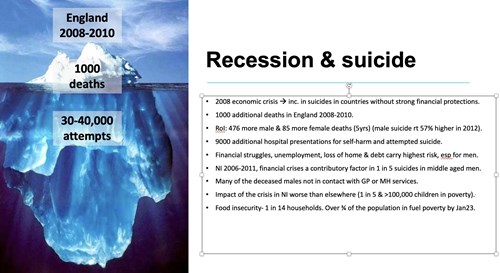
Suicide prevention actions need to target those groups affected by poverty, debt, and financial crisis. We should provide financial support and debt solutions in addition to mental health support and evidence-based suicide-specific interventions.
L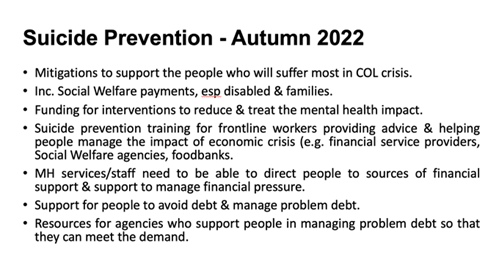
The Northern Ireland Children's Commissioner has highlighted many issues with Children and Young People's Mental Health Services and education that remains concerning. ("Still Waiting" Report). For example, too many young people are being prescribed medication, and there is an increase in referrals via emergency departments. There is a need to expand inspection to include pupil wellbeing.
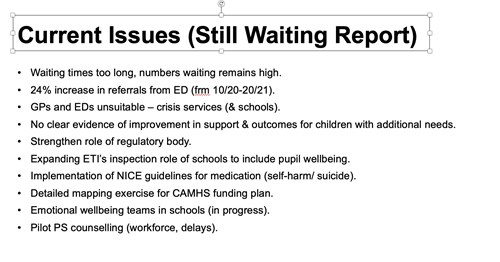
The year ahead
The APG agreed on their Forward Work Programme. The APG will take a more outcome-focused approach, helping to build an evidence base to support policy as well as educate members. The Work Programme will begin with an inquiry into how policy can support effective mental health education and early intervention in school. The inquiry would involve a call for written evidence, followed by a series of evidence sessions with witnesses, including mental health experts from both the statutory and voluntary and community sectors, educationalists, and children and young people. The findings from the evidence received would inform a report that makes policy recommendations.
The APG agreed to the next meeting on the 21st November. If you'd like to attend, please email Caroline Devlin, Area Manager for Community.

